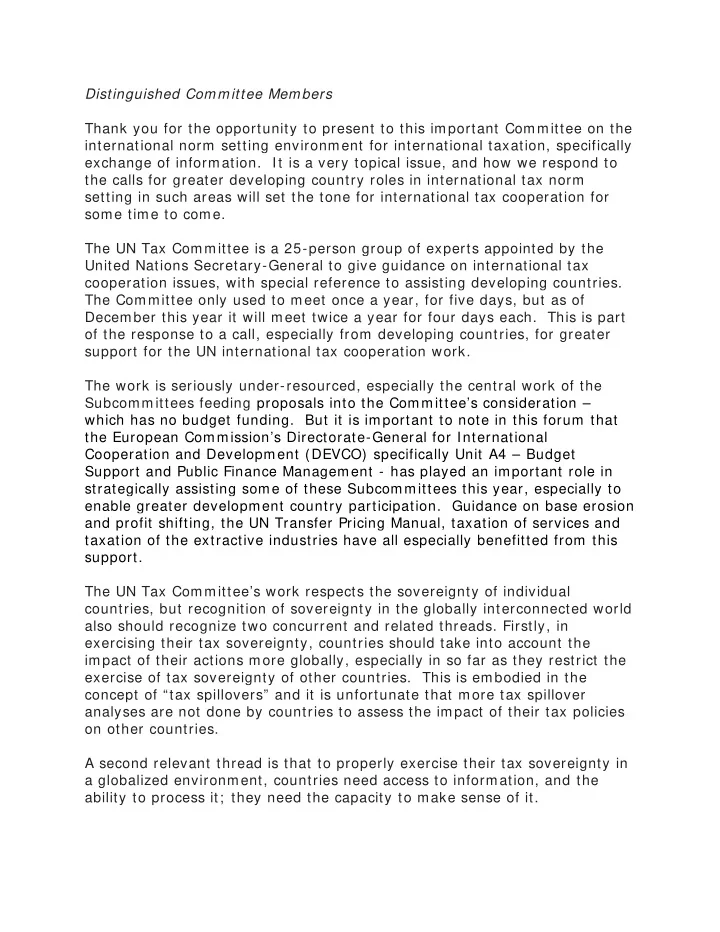

Distinguished Committee Members Thank you for the opportunity to present to this important Committee on the international norm setting environment for international taxation, specifically exchange of information. It is a very topical issue, and how we respond to the calls for greater developing country roles in international tax norm setting in such areas will set the tone for international tax cooperation for some time to come. The UN Tax Committee is a 25-person group of experts appointed by the United Nations Secretary-General to give guidance on international tax cooperation issues, with special reference to assisting developing countries. The Committee only used to meet once a year, for five days, but as of December this year it will meet twice a year for four days each. This is part of the response to a call, especially from developing countries, for greater support for the UN international tax cooperation work. The work is seriously under-resourced, especially the central work of the Subcommittees feeding proposals into the Committee’s consideration – which has no budget funding. But it is important to note in this forum that the European Commission’s Directorate-General for International Cooperation and Development (DEVCO) specifically Unit A4 – Budget Support and Public Finance Management - has played an important role in strategically assisting some of these Subcommittees this year, especially to enable greater development country participation. Guidance on base erosion and profit shifting, the UN Transfer Pricing Manual, taxation of services and taxation of the extractive industries have all especially benefitted from this support. The UN Tax Committee’s work respects the sovereignty of individual countries, but recognition of sovereignty in the globally interconnected world also should recognize two concurrent and related threads. Firstly, in exercising their tax sovereignty, countries should take into account the impact of their actions more globally, especially in so far as they restrict the exercise of tax sovereignty of other countries. This is embodied in the concept of “tax spillovers” and it is unfortunate that more tax spillover analyses are not done by countries to assess the impact of their tax policies on other countries. A second relevant thread is that to properly exercise their tax sovereignty in a globalized environment, countries need access to information, and the ability to process it; they need the capacity to make sense of it.
Exchange of tax information is an important part of this response to globalization, and it also addresses the fact that the failures of governments to exchange tax information, or to enforce foreign tax judgments, have been leveraged to a great degree by those unwilling to meet their tax obligations. The competition between many governments on tax matters and investment and the desire to support national champion companies also is a related factor that can and has been leveraged by those wanting to avoid paying their proper taxes. Tax confidentiality is an important concept, but like many very important concepts, it has at times been abused. It is especially important that it not be abused to improperly deny information to States in the rollout of country-by-country reporting, in order to ensure confidence in that system. The UN Tax Committee’s work on exchange of information has largely focused on the Exchange of Information Article of the UN Model Double Taxation Convention between Developed and Developing Countries and this Article has been updated to make it clearer and stronger in the 2011 update of the Model. This process will continue in the new version of that Model to be released next year. In many areas the UN Model is very different from the OECD Model Taxation Convention, reflecting key differences between developing and developed countries. However, in terms of exchange of information the differences are not great. The commonalities in this area between developing and developing countries are much more apparent than the differences, and most of the strengthening provisions of the OECD Model have been picked up by the UN Model, as being in the interests of developing countries as least as much as they assist developed countries. Sometimes, there are differences that are more of emphasis than of underlying policy. For example, the UN Model emphasizes especially that exchange of information is meant to address "tax avoidance" as well as "tax evasion". This is consistent with the OECD Model and its Commentary, but we emphasize the point because of the view that there is a fine line between aggressive tax avoidance and tax evasion and because the cost to the revenue of developing states is the same, whatever categorization is used. On automatic exchange, the UN Tax Committee has been very supportive of greater use of this, recognizing the great benefits that might potentially flow to all countries, including developing countries, from access to the necessary information. But there is also a recognition that there is a real need for assistance to developing countries setting up such systems, including the information technology, but also the capacity to analyze the information received so that it can be used to best effect.
In rolling out automatic exchange of information globally, we particularly have to avoid setting in place a world of information haves and have-nots that not only further entrenches information and capability gaps between developing and developed country tax administrations, but also entrenches the same gaps between developing countries and multinational enterprises. We in the UN Secretariat wish you well in your considerations and look forward to the outcomes of your deliberations.
Recommend
More recommend